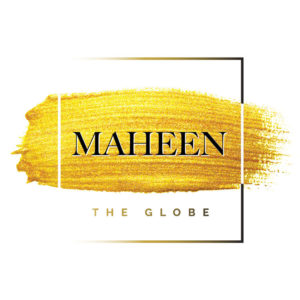From Seattle to Nigeria: African Drums spark a global cultural revival
By Maheen Mustafa
Published September 17, 2025
SEATTLE — As the Pacific Northwest sunset ignited the sky ablaze with fiery pinks, purples and golden hues streaming through the windows of iconic Rainier Tower, the primal thunder of African drums erupted, shaking the calm of Saturday evening.
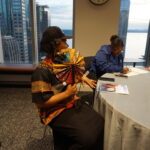 Each beat was a heartbeat, a call to awaken, reverberating through the room like a summons to a forgotten world—a world where rhythm tells stories, heals wounds, and binds continents. It wasn’t just music—it was a call to action, a bridge across oceans, and a blueprint for global healing.
Each beat was a heartbeat, a call to awaken, reverberating through the room like a summons to a forgotten world—a world where rhythm tells stories, heals wounds, and binds continents. It wasn’t just music—it was a call to action, a bridge across oceans, and a blueprint for global healing. 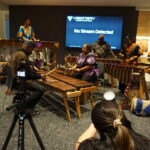
On a night alive with the soul-stirring beats of marimbas, hypnotic storytelling, soulful songs, and the savory aromas of authentic African cuisine, Javoen Walton, the charismatic founder of the Hawk Foundation, stood as a living embodiment of cultural revival. Draped in vibrant, kaleidoscopic African attire, he commanded the room not just as a performer, but as a visionary warrior against injustice, turning a simple gathering into a rallying cry for Afro-diasporic empowerment.
Hawk Foundation- healing history, reviving culture
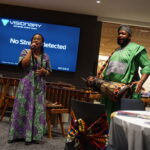
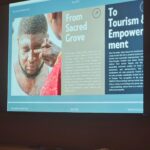 Javoen’s opening act stole the show: a pulsating drum performance that left the audience spellbound. As the beats echoed, he shared a story that cut through misconceptions. “Whenever I mention African drums, I get all kinds of reactions,” he said with a grin. “Most say, ‘Wow, that’s cool—what fun!’ But dig deeper, and I hear, ‘Hey, you do drums, but do you play real instruments?’ As a historian, educator, and head of an institution, do I get offended? No. My job is to invite them on a journey like no other.”
Javoen’s opening act stole the show: a pulsating drum performance that left the audience spellbound. As the beats echoed, he shared a story that cut through misconceptions. “Whenever I mention African drums, I get all kinds of reactions,” he said with a grin. “Most say, ‘Wow, that’s cool—what fun!’ But dig deeper, and I hear, ‘Hey, you do drums, but do you play real instruments?’ As a historian, educator, and head of an institution, do I get offended? No. My job is to invite them on a journey like no other.”
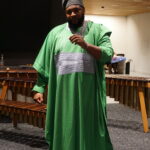
The event, hosted by Global Washington (GlobalWA) on Saturday, September 13, highlighted the Hawk Foundation’s bold mission to tackle some of society’s deepest scars. The organization is laser-focused on promoting education, holistic health, and trauma healing in African American communities, across the African continent, and far beyond.
Global Washington Building Bridges
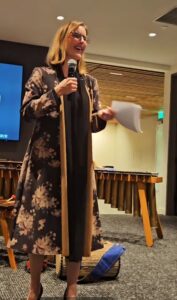
Elizabeth Stokely, a key figure at Global Washington—an organization dedicated to mobilizing international development right here in Washington State—couldn’t hide her excitement. “Wow, there’s something we really need to amplify here,” she told the crowd. “Global Washington is all about building bridges between local and global. We’re all human, and these connections across the world are stronger now more than ever.”
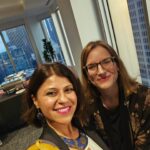 In a time of nonprofit challenges and global divides, she emphasized, partnerships like this with the Hawk Foundation are vital. “They bridge worlds—holding sacred spaces in Nigeria, connecting classrooms in Washington, and forging ties across the African Diaspora in Latin America and beyond. This is the global agenda we’re championing in our state.”
In a time of nonprofit challenges and global divides, she emphasized, partnerships like this with the Hawk Foundation are vital. “They bridge worlds—holding sacred spaces in Nigeria, connecting classrooms in Washington, and forging ties across the African Diaspora in Latin America and beyond. This is the global agenda we’re championing in our state.”
Through innovative programs, the Hawk Foundation addresses educational disparities head-on, and it doesn’t stop at policy—they immerse the world in West African culture via seminars, lectures, and workshops that ignite curiosity in youth and forge cross-cultural bonds.
Yemoja Grove Project – Cultural and Land-based Healing Initiative
At the center of this electric evening? The unveiling of the Yemoja Grove Project, a groundbreaking cultural sanctuary rising in Iseyin, Oyo State, Nigeria. Inspired by the UNESCO-recognized Osun-Osogbo Sacred Grove, this land-based healing initiative is dedicated to Yoruba spiritual traditions, intergenerational wisdom-sharing, and reconnecting the global African Diaspora.
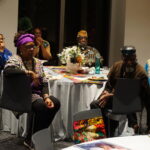 Imagine a verdant haven where ancient rituals meet modern innovation: spaces for music, traditional medicine, and heritage preservation; an annual Yemoja Festival drawing pilgrims from across continents; artist residencies, classes, and recording studios fueling a creative economy; jobs for local artisans, guides, farmers, and young apprentices; and a fierce commitment to safeguarding Yoruba ecological and spiritual legacies.
Imagine a verdant haven where ancient rituals meet modern innovation: spaces for music, traditional medicine, and heritage preservation; an annual Yemoja Festival drawing pilgrims from across continents; artist residencies, classes, and recording studios fueling a creative economy; jobs for local artisans, guides, farmers, and young apprentices; and a fierce commitment to safeguarding Yoruba ecological and spiritual legacies.
Global Impact
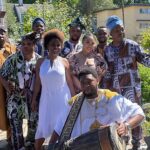
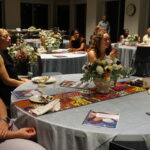 The impact? Transformative. It is rooted in global collaboration, bringing together communities from Nigeria, Cuba, Brazil and the United States who share a common spiritual heritage. Yemoja Grove isn’t just a site—it’s a catalyst, turning Iseyin into a buzzing hub for heritage tourism and spiritual pilgrimage. Revenues from festivals will be reinvested in community infrastructure, creating a self-sustaining model of empowerment. It fosters resilience and creativity, mending the wounds of history while linking scattered Diaspora communities in a web of shared strength.
The impact? Transformative. It is rooted in global collaboration, bringing together communities from Nigeria, Cuba, Brazil and the United States who share a common spiritual heritage. Yemoja Grove isn’t just a site—it’s a catalyst, turning Iseyin into a buzzing hub for heritage tourism and spiritual pilgrimage. Revenues from festivals will be reinvested in community infrastructure, creating a self-sustaining model of empowerment. It fosters resilience and creativity, mending the wounds of history while linking scattered Diaspora communities in a web of shared strength.
Why it matters?
Yemoja Grove directly addresses post-colonial harm and cultural erasure that have long devalued indigenous African cultural spiritual practices and severed communities from their cultural wealth. By investing in sacred spaces like Yemoja Grove, they create pathways for economic opportunities rooted in cultural ownership, not exploitation. This project is more than preservation—it’s about reclaiming narratives.
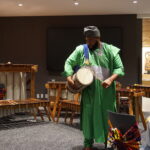
Javoen painted a vivid picture of drums’ profound power in West Africa—not mere entertainment but living archives. “They make us feel good, hit great rhythms, but they also speak, preserve history, and act as messengers,” he explained. In Nigeria’s southwestern Yoruba region, drummers aren’t just musicians; they’re historians, chronicling lineages that span 5, 10, or even 20 generations.
“Before we drum, we respect our elders—’ We see you first; you are the leaders.’ The drum can speak.” This philosophy drives the Yemoja Grove’s progress. Phase one is complete: forging alliances with Nigeria’s Ministry of Culture, indigenous drummers, kings’ courts, elders, and women through authentic cultural channels. Now, phase two is underway—construction, programming, and global outreach to make this dream a reality.
The Hawk Foundation is scripting a new chapter in Afro-diasporic history, one beat at a time. The world is watching; will it join the rhythm? Learn more here: Home | The Hawk Foundation
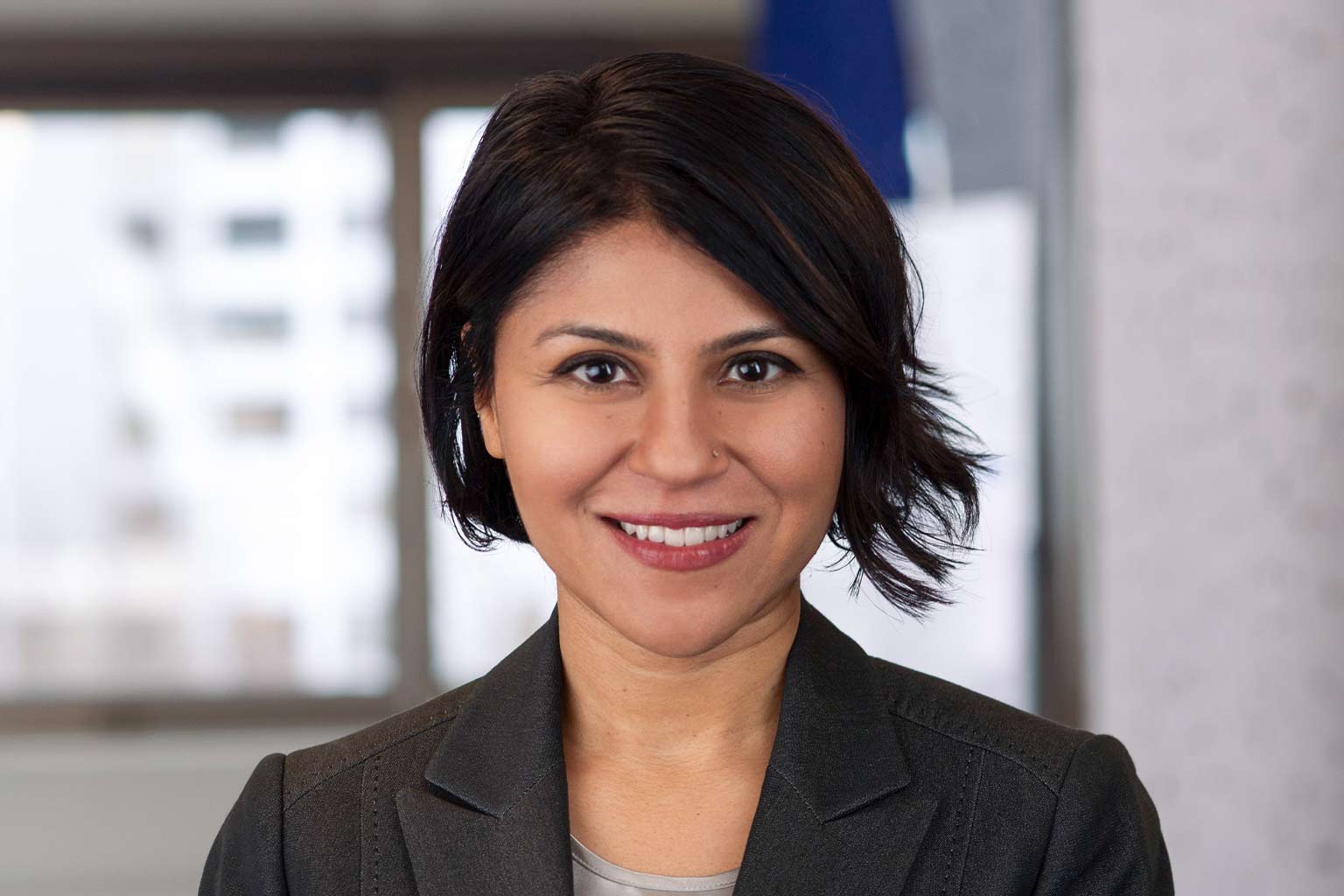
This feature was written by Maheen Mustafa, former director of Committee for Children, a social impact journalist, and founder of MTG—a Seattle-based media outlet and production house dedicated to elevating BIPOC and immigrant narratives through powerful storytelling. Follow her @MaheenM_.
